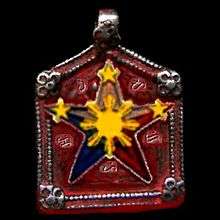Pulahan
 An agimat, intended to be worn with a necklace | |
| Total population | |
|---|---|
|
Currently none; 10,000–15,000 (c.1900) | |
| Founder | |
| Dios Buhawi | |
| Regions with significant populations | |
|
| |
| Religions | |
| Folk Catholicism | |
| Scriptures | |
| Bible, texts relating to Philippine mythology | |
| Languages | |
| Visayan languages, Spanish, Tagalog |
The Pulahan (literally "those wearing red"; pl: Pulahanes; Spanish: Pulajan), also known as Dios-Dios, refers to the members of a religious revival of Philippine beliefs that developed in the Visayas prior to the Philippine Revolution. At its peak, it numbered around 10,000–15,000 adherents. The movement was severely crippled during the Philippine Revolution after the Philippine Constabulary took over patrols in Samar, when the U.S. military declared the island as "pacified".
Beliefs
Pulahanes practiced a syncretic religious revival centered mostly on Philippine mythology and Folk Catholicism. Individual beliefs include the use of anting-antings as well as the revival of the babaylan.[1] Indigenous fighting techniques such as eskrima were also utilized in the elite and ferocious combat style.[2] They practiced a form indigenous martial arts called Derobio Eskrima and they specialize using a heavy, crescent-shaped bolo knife in their battles. Religious rituals using bottles of holy oil, prayer books such as the Bible, consecrated anting-anting, as blessings before battles.
Americans have described Pulahanes as notorious fighters and are experts in hand-to-hand combat. War cries were also common among their fighters. They have also been described as "lacking in strategy" due to their high casualty figures in battles such as Massacre at Dolores. They have been the subject of many laws passed during the early American colonial period and have often been accused of "banditry".[3]
References
- ↑ "Severino: Cinco de Noviembre: Revolution or Hacienda?". Sun.Star Bacolod. 2006-11-04. Retrieved 2010-03-06.
- ↑ "Ola`a-Nalo Eskrima". Ola`a-Nalo Eskrima. 1992-07-29. Retrieved 2010-03-06.
- ↑ "A History of Philippine Baptist Pastors 1898-2002". Bwa-baptist-heritage.org. 1983-08-29. Retrieved 2010-03-06.
Further reading
- Alejandrino, Jose M. (1949). The Price of Freedom.
- Constantino, Renato (1972). The Philippines: A Past Revisited. Manila.
- Ileto, Reynaldo (1979). Pasyon and revolution: Popular Movements in the Philippines, 1840–1910. Quezon City.
- Linn, Brian McAllister (1999). "The Pulahan Campaign: A Study in US Pacification". War in History. 6 (1): 45–71. doi:10.1177/096834459900600102.
- May, Glenn Anthony (1981). Battle for Batangas, a Philippine province at war. New Haven.
- Ochosa, Orlino A (1989). The Tinio Brigade: Anti-American resistance in the Ilocos provinces 1899–1901. Quezon City.
- Roth, Russell (1981). Muddy Glory: America’s "Indian Wars" in the Philippines 1899–1935. Boston.
- Sturtevant, David R (1976). Popular Uprisings in the Philippines 1840–1940. Ithaca.
External links
- Messianic complex:Undying faith and the struggle for Kalayaan by Jolita C. Atienza (p15)
- Messianic Leaders of the Revolution by Paul Dimayuga